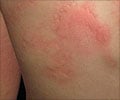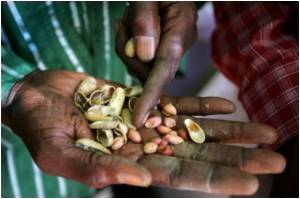Patients with familial (hereditary) cold urticaria develop symptoms such as skin rash combined with head and joint pain when exposed to temperatures below 15 °C. New study points to alternative treatments as conventional treatments are ineffective in some people with the disorder.

‘Cold urticaria is a condition in which exposure to cold temperatures causes itchy hives to appear on the skin.’
Read More..




Researchers led by PD Dr. Karoline Krause of the Department of Dermatology, Venereology, and Allergology on Campus Charité Mitte have now discovered a new form of cold urticaria which is caused by a previously unknown mutation in the 'Factor 12' gene. The name proposed for this new hereditary disorder is 'Factor XII-associated cold autoinflammatory syndrome,' or FACAS.Read More..
"Our report relates to several members of the same family seen in our department. At least one person in each generation of this family reported identical symptoms, which they had suffered from birth," explains PD Dr. Krause. She adds: "These individuals all developed a burning skin rash after 30 minutes of exposure to temperatures below 15°C (59°F). The rash was exacerbated by windy weather and humid conditions, and only resolved several hours after the individual returned to a warmer room."
The patients also reported other symptoms like chills, fatigue, headache, and joint pain. In contrast to people who develop cold urticaria spontaneously, these patients did not respond to a cold provocation test known as the 'ice cube test.' Their symptoms also failed to respond to antihistamines, which are normally an effective treatment for cold urticaria.
"The family's symptoms were clearly indicative of a hereditary form of cold urticaria," says the dermatologist. "We, therefore, studied the affected individual's genetic information, looking for mutations which are known to cause the disorder's hereditary form; but to no avail. What we found instead was a previously unknown defect in the Factor 12 gene."
The researchers were then able to show that this defect leads to the activation of the contact system pathway and that the hives are produced as a result of the subsequent release of inflammatory mediators.
Advertisement
Interestingly, one of the FACAS patients showed an immediate response when given icatibant, a drug normally used to treat acute attacks of hereditary angioedema. Upon administration, the patient's cold-induced symptoms resolved quickly and almost completely.











